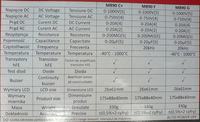LuckyDj wrote: And yours, what is the largest ACV/DCV measurement range?
Because for me, moving the switch by these two or three positions is not a special problem.
Depends which one, but most are 750/1000V. Switching is the problem, you say that because you've never used an automatic. Give it a try and you'll probably change your mind.
LuckyDj wrote:
You draw conclusions based on one broken switch.
You wrote that you use these meters at school, so I'm 100% sure that it was damaged by someone's stupidity, not a poor quality switch.
I draw a sentence based on many UNI-T in which the switch from constantly changing ranges is defective. Young people perform various exercises and are forced to turn the switch every now and then. This causes accelerated wear of the contact pads on the PCB (they wear out) and stop connecting. This is not related to stupidity or wrong setting of the range, but only to this defect of the meter with manual range change.
LuckyDj wrote:
The meter you propose to your colleague has the same ACV and DCV range as UT, so you will not measure higher voltages with it either.
I do not suggest measuring higher voltages to anyone and I have not written about anything like that anywhere. I only suggest that you refrain from buying UNI-T and focus on other meters, taking into account that it should have a built-in automatic device that increases the durability of the device, facilitates measurements and often protects against routine. What is the maximum AC/DC voltage is the least important.
LuckyDj wrote: It also does not measure inductance, temperature and logic states. Besides, I don't think it's a good meter for PLN 70 ... but it has an automatic device

It's better than most UNI-T, because it's hard to find a meter worse than UNI-T.
This is my opinion based on the use of a number of pieces there.
I consider the measurement of inductance or capacitance using the time constant method to be unnecessary and practically useless as other gadgets of this type. Still measuring the temperature makes sense.
LuckyDj wrote:
Unfortunately, as of today, in this and other cases, the price is an exponent of quality.
In meters, the price is not very often an exponent of quality or functionality. I know it very well, because I use meters of various brands and types myself.
We talked about meters from the M-890, basically the lowest shelf. I found the MY-68 at this price, which, apart from the fact that it has an automatic, looks more solid than the M-890.
I prefer to buy a machine for PLN 70, since I have such an opportunity, than to kill myself with constantly switching ranges in the m-890 meter for the same money.
In addition, the MY-68 has:
-display 3 and 3/4, not 3 and 1/2 as in M-890
- memory of the last measurement,
- bargraph
-holder included
-



